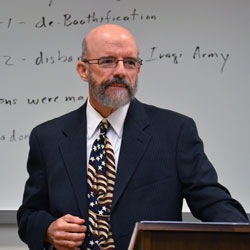James P. Pfiffner is University Professor emeritus in the Schar School of Policy and Government at George Mason University. His major areas of expertise are the Presidency, American National Government, public management and the national security policy process. He has lectured on these topics at universities in Europe and throughout the United States as well as at the Federal Executive Institute, the National War College, the U.S. Military Academy, and the Departments of State, Justice, and Defense.
He has written or edited sixteen books on the presidency and American National Government, including The Strategic Presidency: Hitting the Ground Running (2nd edition, 1996), The Character Factor: How We Judge Our Presidents, (2004), Power Play: The Bush Administration and the Constitution (Brookings 2008), and Torture as Public Policy (2010). He has also published more than 100 chapters and articles in books and scholarly journals.
His professional experience includes service in the Director’s Office of the U.S. Office of Personnel Management (1980-81), and he has been a member of the faculty at the University of California, Riverside and California State University, Fullerton. He has testified about the presidency before both Houses of Congress.
In 2007 he was S.T. Lee Professorial fellow at the Institute for Advanced Study at the University of London, and in 2013 he was visiting professor at Griffith University in Brisbane, Australia.
He is an elected member of the National Academy of Public Administration, and he has been a panel member or on project staffs of the Volcker Commission, the Center for Strategic and International Studies, the National Academy of Sciences, and the Center for the Study of the Presidency. He received the Distinguished Faculty Award at George Mason University (1990) and the College of Arts and Sciences Award for Scholarship (1999). He is listed in Who’s Who in America and Who’s Who in the World.
While serving with the 25th Infantry Division (1/8 Artillery) in 1970 he received the Army Commendation Medal for Heroism (with “V” device) in Vietnam and Cambodia.

